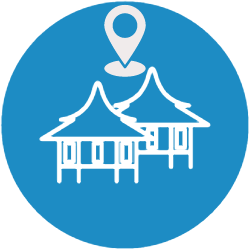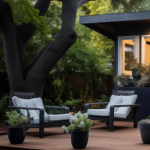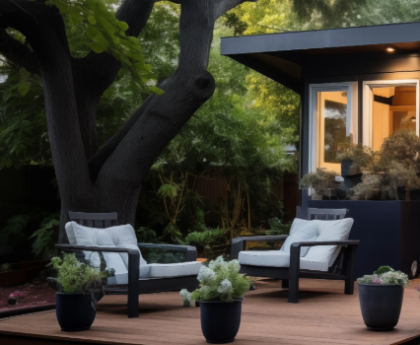
Addressing topics like building heights, off-street parking and impact fees, the Edmonds Planning Board April 24 approved a set of recommendations for accessory-dwelling units (ADUs) and detached accessory-dwelling units (DADUs). The recommendations will be presented to the Edmonds City Council on May 7 as part of the city’s 2024 Comprehensive Plan update and will include a public hearing.
The planning board met on April 11 to discuss city staff’s ADU/DADU recommendations, which are designed to comply with state House Bill 1337 – but agreed to wait until the April 24 meeting to vote on any changes. Those initial staff recommendations were:
- Allowing two ADUs on all lots in any configuration.
- Allowing a maximum height of 24 feet.
- Not requiring rear setbacks if the rear lot line abuts a public alley.
- Allowing DADUs to be sited at a rear lot line if the lot line abuts a public alley.
- No setback requirements, yard coverage limits, tree retention mandates, or restrictions on entry door locations or aesthetic requirements that are more restrictive than for the principal unit.
- No additional parking required for ADUs.
- No design restrictions.
- Allowing ADUs up to 1,200 square feet, depending on the zoning area (RS-10, RS-12, RS-20).
- Allowing ADUs to be sold as condominiums.
- Not requiring owners to reside in one of the units.
- Allowing impact fees of no more than 50% of the fees imposed on the principal unit.
The board April 24 made some changes to those staff recommendations, as follows:
ADU/DADU height and setback
The board voted 7-0 that ADUs and DADUs should be no less than 1,000 square feet in size on RS-6 and RS-8 zones, and a maximum size of 1,200 square feet in RS-10 to RS-20 zones. The latter would increase residents’ freedom to build ADUs or DADUs that will work best for them without the crowding that such buildings would generate on smaller lots.
“The board is recommending that ADUs and DADUs maintain the same setbacks as single-family homes but allow a reduced rear setback for DADUs with a height of 15 feet or less,” Planning Board Vice Chair Lauren Golembiewski said in an email following the meeting. “For RS-6 and R-8 zones, rear setbacks could be reduced to 5 feet, and (for) all other zones (the setbacks would be) 15 feet for DADUs of 15 feet or less in height.”
Planning Board Chair Jeremy Mitchell said in an email that the setback reductions would incentivize lower ADU and DADU heights in response to public concerns about massing.
“The board is recommending a hybrid of the HB 1337 maximum allowable gross floor area based on lot size,” he said.
Additional off-street parking
The board voted 7-0 to add an extra parking spot for a second ADU or DADU built on a lot, but not for the first.
“This represents a compromise to the feedback received by the public in regards to those wanting the provided parking and those who do not want the parking to be another barrier to building these,” Mitchell said in his email. “It essentially makes it so each individual dwelling unit has one parking space, as the principal unit on the lot per our existing code already requires two spaces.”
The board acknowledged that the parking provision would depend on market demand, influenced by how the property owner designs the ADU or DADU. Also, properties within a half-mile radius of major transit stops will still need to adhere to the parking requirements outlined in HB 1337.
Impact fees
The board voted 7-0 to keep the impact fees at 50% of the amounts the city imposes onsingle-family homes, which HB 1337 allows. The board does not feel that the 50% amount will discourage ADU or DADU development.
“The city can apply impact fees up to 50% of those assessed for single-family homes per HB 1337,” Golembiewski said in her email. “The options were to use the 50% allowed (Option A) or offer even more of a reduction (Option B). The board is recommending impact fees at the maximum allowed percentage, 50% of those assessed for single-family rentals.”
Water, sewer and utility metering
Mitchell said that utilities “are not in the planning board’s purview” and will be handled between the service provider and the city’s engineering department.
The Public Works Department considers ADUs to be dependent upon the primary residence and within the capacity of its existing infrastructure. Therefore, all new or extended utilities must be underground in accordance with Edmonds municipal code 18.05.010.
ADU or DADU and primary home occupants must have unrestricted access to the utility controls (including water, electricity and gas) in each respective unit or in a common area.
Only one water service and meter and only one sewer lateral are allowed per parcel to serve the primary residence and each ADU. Private submetering on the property is allowed, but the City of Edmonds is not involved with installing or reading the submeter. Also, separate connections to the main trunk line of the sewer lateral will not be permitted.
In discussing how to submit the recommendations to the council, Edmonds City Planner Rose Haas said that describing the pros and cons of each recommendation can be “subjective” because “what would be a pro could be a con for others.” Meanwhile, many board members suggested that a rationale or justification should be included for each recommendation.
— By Nick Ng



